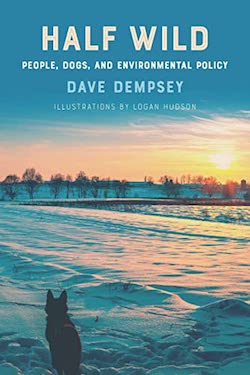SEJournal Online is the digital news magazine of the Society of Environmental Journalists. Learn more about SEJournal Online, including submission, subscription and advertising information.
BookShelf: Straddling the Narrow Divides Between Humans, Animals and Environmental Policy
“Half Wild: People, Dogs, and Environmental Policy”
By Dave Dempsey
Michigan State University Press, $27.95
Reviewed by Gary Wilson
Dave Dempsey’s 40-year career as an environmentalist-author in Michigan, Minnesota and beyond has given him diverse and sometimes disparate roles.
 |
An environmental adviser to former Michigan Gov. James J. Blanchard from 1983 to 1989, he moved on to work in the nonprofit world. He took a break from that from 2011 to 2017 when he served as a policy adviser for the International Joint Commission, a State Department-level government agency that advises the United States and Canada on water issues they have in common along their borders.
Most recently, Dempsey has served as policy adviser for FLOW, a Traverse City, Mich.-based environmental group dedicated to protecting the Great Lakes in court through the use of the public trust doctrine. FLOW draws its name from the words For Love of Water.
Somewhere along his career trek, Dempsey became a prolific author of books, mostly about the Great Lakes he treasures so much. His latest is “Half Wild: People, Dogs, and Environmental Policy.”
His diverse work experience prompted his publisher to say that Dempsey has led a half-wild professional existence, similar to the way that “humans and canines have been cohabitating for centuries.”
Wildlife as ‘tourism prop’
Dempsey begins “Half Wild” with a story from his youth, in which he visited an open outdoor garbage dump in northern Michigan that served as a “buffet for bears.”
The experience of watching a bear
sort through trash prompted him to ask
if an animal is still wild when it’s conditioned
by humans to feed on human waste scraps.
The dump also provided amusement for the locals and vacationers who came to watch the bears sort through trash and hazardous household waste in search of food scraps.
The experience prompted the suburban Detroit youngster to ask if an animal is still wild when it’s conditioned by humans to feed on human waste scraps.
“Is it still wild or is it a tourism prop, like a circus animal?” Dempsey wondered.
He admits he doesn’t have the answer.
What constitutes a wilderness?
Then, Dempsey describes an encounter as Blanchard’s environmental adviser, when he agreed to meet with a legendary sportsman and conservationist who went by the name of Shep.
Shep was best known as the Old Man of the North Country and for being well-intentioned, even though he had a reputation for taunting government bureaucrats, for whom he had little tolerance.
The discussion was about what constitutes a wilderness.
As chronicled by Dempsey, Shep referred to him disparagingly as a “greenie” who represented an elitist viewpoint. Steeled by a bottle of bourbon he had brought to share with the wily Shep, Dempsey pushed back and eventually was able to shift the conversation where there could be common ground.
But a lesson was learned: There’s a nearly irreconcilable difference between what we call conservationists and environmentalists. The cultural differences and financial disparities between the groups mean that each takes different approaches to issues and it’s rare that they collaborate.
At 102 pages, “Half Wild” is a booklet more than a book but Dempsey is a master at saying more with less. His style reminds me of the legendary French author, Marguerite Duras, whose sparse style spoke volumes.
At this point in his life, Dempsey could have written a memoir about his Great Lakes career but expanded it to include interconnected national issues.
“Half Wild” includes bonus content for dog lovers, though. Dempsey writes about his relationships — humorous and frustrating — with dogs over the years. Because, you know, they’re half wild.
Gary Wilson is an independent journalist in Chicago who reports for Detroit Public TV’s Great Lakes Now initiative and for Planet Detroit.
* From the weekly news magazine SEJournal Online, Vol. 8, No. 3. Content from each new issue of SEJournal Online is available to the public via the SEJournal Online main page. Subscribe to the e-newsletter here. And see past issues of the SEJournal archived here.













 Advertisement
Advertisement 



